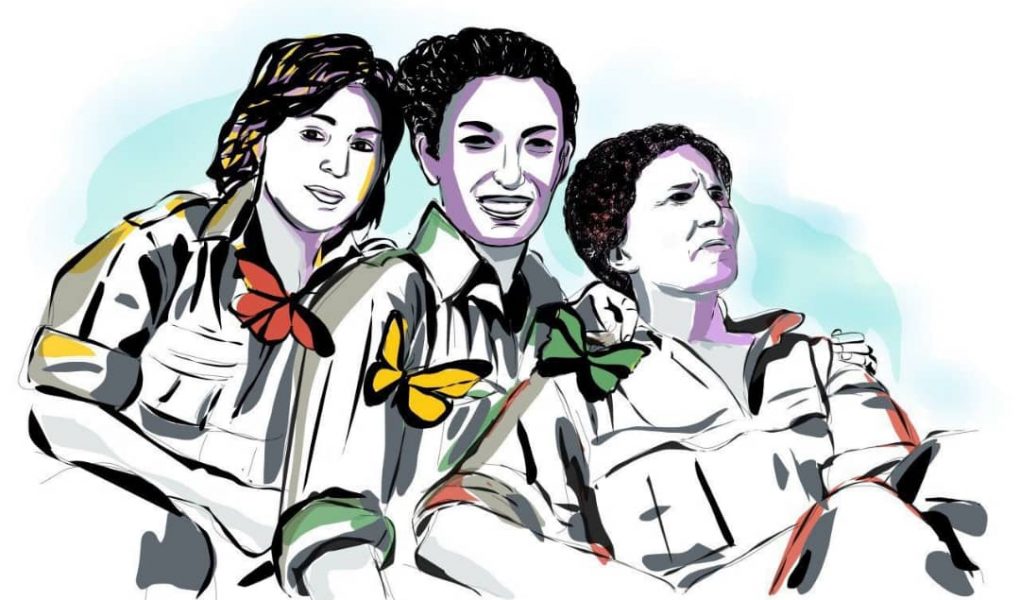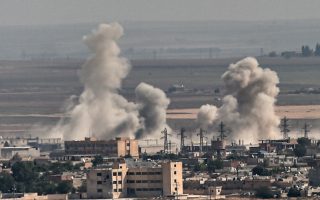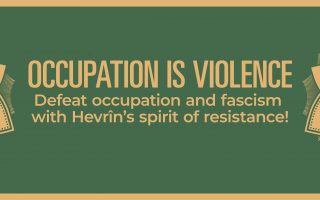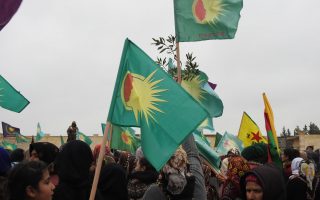We want to share with you the memories, thoughts, pain and feelings of a comrade. She shared life and struggle with 3 revolutionary women who were the protagonists of that struggle that laid the foundations of the women’s revolution in Rojava.
Zilan Diyar
tells us about them, about the unbridgeable void they left behind and
what they taught her. Because Heval Sara (Sakine Cansız), Heval
Rojbin (Fidan Doğan) and Heval Ronahi (Leyla Şaylemez) were above
all our comrades and our inspiration. As us,
they loved, fought and suffered but what
made them a guide for us is that they found the strength not to give
up and shared it with everyone they met.
Zilan speaking of heval
Ronahi says:“And Ronahî.
I am silent because words cannot pass the test of intimacy.” But
then continues:“I can tell her through the friends I have listened
to.”
It is difficult to tell, impossible to give justice to their lives in words, but it is important to share what they have taught us so that the strength they have given us will always be greater and always reach comrades in the fight against those who have torn them from us.
Here is what she wrote a year after our comrades were taken from us.
There are many definitions of time. One is that time is ungrateful. Time is only a page in the calendar for people unable to keep lived moments, for the ones who lose the ability to give meaning to things. Time is unlimited, or a repeating limit. Time is the cure for shallow wounds. It’s possible to recover in its compassionate arms, sorrows, anger and defeats. Time is an impatient and irreverent child. It does not wait for you and if you do not give what is expected does not even look at you, passes ahead and crushes you. Those who merge themselves with the truth are wise.
Time pays the right price for every instant, sorrow and joy shared, for this reason it is always calm and clear. It is a drop of water which reaches the quiet of the oceans, frantically flowing.
Time is unable and powerless. There are memories that it cannot make you forget, wounds it cannot soothe, and facts that it cannot teach. We Kurds recognize it mainly in this definition. While we tried to exist in the universe and to breath as who we are in front of what we have lost, time appears to us in this aspect. This is because an equivalent of what we have lost does not exist, an aspect of our sorrow to which we can become used does not exist, even though it always repeats itself. Time for us is an imposter who plays bizarre games.
One day you shed tears for the love of someone and then suddenly you became a tear shed for love. This is the definition for time that our fight taught us, a fight that according to your dimensions has lasted from 35 years, or a century.
A year has passed since we lost our companions. It seems that only a second has passed since January 9th to now. Our wound has never stopped bleeding, so it seems to us that only a second has passed. But a century has passed since then. The days have passed so difficult, they pass so difficult… it is a year that the sun hides itself behind the clouds, in shame. We called and shouted at the doors of the `gentlemen` who create storms from a glass of water, not because` justice` would heal our wounds, but because it would be a drop of water to extinguish the fire that sets our hearts ablaze. We screamed until we were out of breath, so that they would choke on each breath. Patience could not look at us, it was ashamed of having nothing to say to us. We were angry with those who remained silent, with those who were ashamed, with all those who did not put their conscience in the orbit of this pain, against any type of order. We were angry at ourselves, because we hadn’t been able to say stop at the most treacherous and perfidious passage of time. We missed, because the human miracle has not yet defeated the so called death. While we tried to reach the truth, reached by that humanity that claims to be the daughter of the dust of the stars, we learned to breathe always looking to the sky. This centennial pain will bring us closer to the truth. Because we learned this from them, I learned it from them… The link that exists between loving and understanding, that a revolutionary must not turn her back to the small joys and drops of meaning that life offers her and must contribute to the great dream of the future. Feel the soul of a flower while you breathe its perfume, of the earth when you touch it, of fire while you are looking at it. Sometimes, even if it means dying, to roll in the snow that covers the mountains, to be drenched in the pouring rain. Borrow the eyes of a child while you caress him, of a companion when you hug him, of a woman while listening to her worries. Be impatient like a child and patient like a dervish, while you hope. Be as rebellious as much as possible against the enemy and humble towards your comrades. Never stop trusting people even if you have known betrayal. When you suffer an injustice, know how to turn to yourself, saying `whatever exists, exists in me`. If you want you can reawaken by hitting the dagger in your heart. Transforming separations into the ferment of a new encounter. People are at the same time very crowded and very alone, they are both a very clear message and an undeciphered secret. I learned that a revolutionary who, when it came to resistance, did not shed a tear or drop of blood, while inserting the knife into her flesh and who did not utter a single lament, and when it comes to the tears of a comrade, she can dry the source. I learned all of this from Heval Sara, from Sakine Cansiz, the red-haired rebel of Dêrsim. And I learned about regret. I experienced the regret of having contented myself with what was being told instead of understanding and not having tried hard enough to see what was beyond the visible.
I also learned a lot from dear Rojbîn. Rojbîn taught me that the truth is very close to reality and that to reach it you have to be simple, selfless, not calculating, and joyful. From Rojbîn I also learned to forgive. That grudges are a magnet that corrodes the human being from the inside and not the thing towards which he feels anger. Perhaps her grace was a balance created to understand the rough behavior you could have encountered. Her sincerity was proof of all the falsehoods. She had established crossroads within herself to bind heart and mind together. For this reason love was in the same places as critics. In those crossroads where the heart and the mind meet she weighed the words of the crowds and then spoke. She always carried faith and justice with her to balance the scales. Rojbîn was a rebel who placed tons of dynamite at the foot of the temple of the masked gods. She never tried to look like she wasn’t. The secret of her getting along with everyone was her ability to explain her moods. In every moment she lived it was possible to see the colors of life. Take a look at her mother’s treasure our Fidan, and immediately you see her so far away from her mother, for example in Venezuela collecting signatures. Then look again and our Rojbîn who a moment earlier was knitting booties for her granddaughter is occupying a church. But not arguing, with a smile on her lips, with elegance in her bearing and words and with persuasive tone. She always clung to the smiling side of life. In the sky she clung to the sun not to the clouds, in people not to that sleeping monster that is badness but to that angel with wings that is goodness, in the fight she clung not to death but to life and peace. She was never one of those people who played hide and seek with themselves. She always grew because she never refused confrontation with herself. These things she taught me by living. I want you to teach me again and again, I want to be grateful to you again for making bearable the realities with which I am struggling, I want to travel the shorter roads that you showed me while I chose indirect roads on the way in search of the truth. And Ronahî. I am silent because words cannot pass the test of intimacy. I don’t want to damage the meaning of words by saying a few to make pain bearable.
I can tell her through the friends I have listened to. She was very brave, she had that special courage on the verge of revolutionary madness. And then because I knew the bond she had with Heval Sara I say to myself in a sure tone of voice `she never lost the way`. I would show her as an example to those young people who are stuck in depression and who regard it as a challenge against the established order. This is how exile is challenged, by bringing a land into one’s heart. She chose not to represent the mortality of those who died in his native land but to be in struggle, she chose eternity. I would like those who are able to make their experiences, memories and testimonies into words, to tell, or keep silent.
Zilan Diyar




